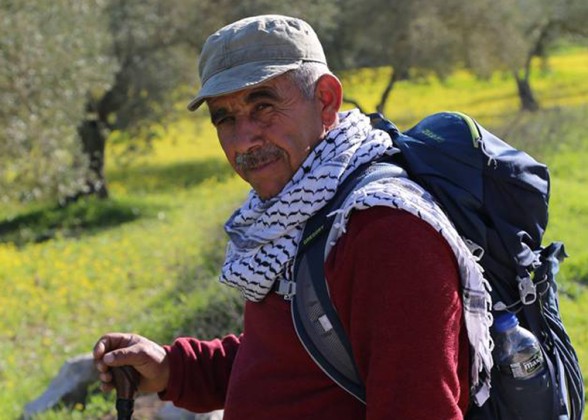Saeed Hijjih ‘Abu Ayman’

Saeed Hijjeh, also know as Abu Ayman, is in his mid 50s and is one of the trail most knowledgeable local guides. He has walked the entire trail in the West Bank, and is thought of as a role model for new guides. Before he became a guide on the The Palestinian Heritage Trail, Abu Ayman was working as a librarian at the Arraba Municipality, but had limited knowledge about his town and his country. In 2013, The Palestinian Heritage Trail team visited Arraba’s municipality, seeking cooperation as they set about the task of scouting new trails in the region. Abu Ayman was appointed by the Municipality to be the local contact who would help scout the new trails.
“On the first hike, I wasn’t sure if I could make it to the end, and I was planning to sneak out though an olive grove at about the halfway point, and go home. I am an old man, who is not in the best of shape, and my hiking abilities are not the strongest. However, I was wrong. I discovered in myself a new ability to walk, and I learned more about The Palestinian Heritage Trail. Later on, I volunteered to join the team while way marking the trail in Nablus, and again, I found it easy to hike along with the group because I was interested in the surroundings, and I also enjoyed being part of the team. I continued to offer my support and joined the way marking team in additional stages on the way toward Jericho. During this journey, I have learned a lot about other religions, the beauty of the area, as well as archaeological and religious sites that I had never heard about before. Of course I also gained a new appreciation of the diverse landscapes, fauna, and flora. In addition to the experience I gained while scouting, I benefitted from the The Palestinian Heritage Trail trainings. These courses include first aid, trainings on how to be a guide, and way marking. I also received hiking equipment from the The Palestinian Heritage Trait project. Originally, my community did not welcome the new ideas that the The Palestinian Heritage Trail brought — they thought that I was wasting my time with foreigners. However, they changed their minds once they witnessed the positive impact on myself, my personality, and my family, as well as the opportunities I received and the financial benefits. Now, I am a vital part of the The Palestinian Heritage Trail, and I am always in the field guiding local and international walkers.”
Through this work as a guide on the The Palestinian Heritage Trail, he has also collected many stories about Palestinian heritage. As such, he is also a storyteller who brings traditional stories to life. He learned these stories from the older generation, targeting schools and university students, women, and the community’s youth based on contracts with MoEHE and MoTA, as well as other local NGOs which have become an additional source of income for him.
“Without the The Palestinian Heritage Trail, I wouldn’t be able to enhance my financial status, and I wouldn’t be able to afford university tuition fees for my four college-aged daughters. Now, I can finally say that I have found myself. Without the The Palestinian Heritage Trail, I wouldn’t be able to reach a point where I am a financially stable and well-respected person.”
Abu Ayman concluded his story by saying:
“I’m a smoker, and I am not a young man, but on the Palestinian Heritage Trail, I feel 20 years younger. I have become very well-known, gaining the title “the king of tourism of Arraba.” I was one of the first locals to start working as a guide for national and international walkers along the whole trail. I consider The Palestinian Heritage Trail to be one of Palestine’s greatest resources. It benefits individuals as well as communities, and it is a tool that highlights the Palestinians’ good reputation abroad.”



